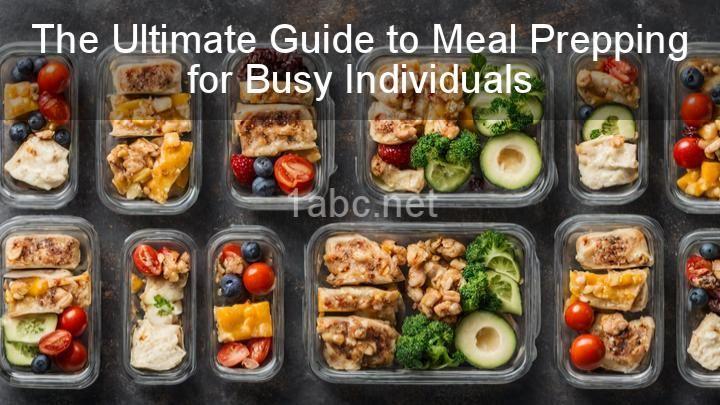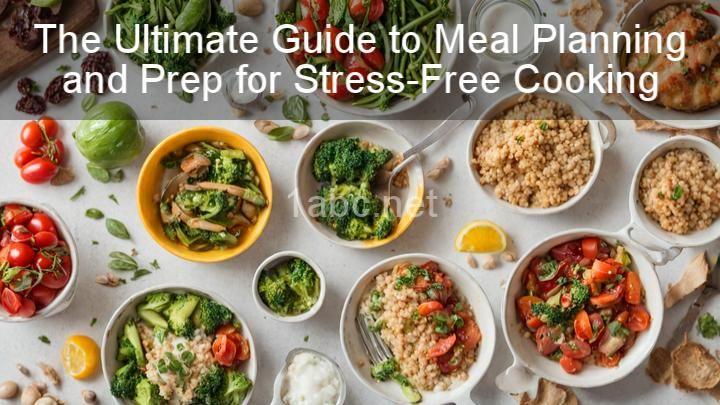5 Easy Meal Planning Tips to Save Time and Reduce Stress

Introduction:
Are you tired of rushing to the grocery store after work and staring at a blank canvas in your kitchen, wondering what to cook for dinner? Does the thought of meal planning overwhelm you? Well, fret not! In this blog post, we will discuss five easy meal planning tips that will not only save you time but also reduce your stress levels. Meal planning is a game-changer when it comes to managing your time effectively and ensuring that you and your family enjoy delicious and nutritious meals throughout the week. So, grab a cup of coffee, sit back, and let's dive into these tips together!
I. Assess Your Schedule and Preferences:
Before embarking on your meal planning journey, it's essential to assess your weekly schedule and personal preferences. Take a few minutes to evaluate your family's activities, work commitments, and any dietary restrictions. This assessment will help you plan meals that fit seamlessly into your lifestyle and cater to everyone's preferences. Consider creating a list of family-favorite meals and noting any dietary restrictions, such as allergies or vegetarian/vegan preferences. This list will serve as a starting point for your meal planning adventure and ensure that you always have go-to recipes on hand.
II. Plan Your Meals Ahead:
Planning your meals in advance is a game-changer when it comes to saving time and reducing stress. By knowing what you'll be cooking for the week, you can eliminate last-minute grocery store runs and the panic of figuring out what to cook each day. Start by deciding how many meals you want to plan for the week. It could be all three meals or just dinner. Next, consider incorporating a variety of proteins, grains, vegetables, and other food groups to ensure a balanced and nutritious diet. This variety will also keep your taste buds excited throughout the week.
III. Create a Weekly Meal Calendar:
A visual meal calendar is a fantastic tool to stay organized and on top of your meal planning game. You can create a calendar on a whiteboard, a paper planner, or even use online templates or smartphone apps for convenience. Sit down with your family members and involve them in the decision-making process. This way, everyone's preferences are considered, and you can avoid any mealtime battles. Encourage your kids to suggest their favorite meals and get them excited about what's on the menu. Remember, meal planning is a team effort that brings everyone together.
IV. Make a Grocery List:
A detailed grocery list is a meal planner's best friend. After finalizing your weekly meal calendar, go through each recipe and create a comprehensive grocery list. Organize the list by categories such as produce, pantry items, proteins, and dairy. This organization will save you time during your shopping trips and ensure that you don't miss any essential ingredients. Before heading to the store, take a quick inventory of your pantry staples and cross out any items you already have. This step will prevent unnecessary purchases and save you money in the long run.
V. Batch Cooking and Meal Prepping:
Batch cooking and meal prepping are two fantastic strategies to save time and reduce stress in the kitchen. Batch cooking involves preparing larger quantities of staple ingredients like rice, beans, or roasted vegetables that can be incorporated into multiple meals throughout the week. For example, you can cook a big batch of rice and use it for stir-fries, grain bowls, or fried rice. Meal prepping, on the other hand, involves preparing components of meals ahead of time, such as marinating proteins, chopping vegetables, or assembling casseroles, and storing them in the fridge or freezer. This way, when it's time to cook, you already have most of the work done, making dinner preparation a breeze.
Conclusion:
Congratulations! You've made it to the end of our journey through the world of meal planning. We've discussed five easy tips to save time and reduce stress in the kitchen: assess your schedule and preferences, plan your meals ahead, create a weekly meal calendar, make a grocery list, and embrace batch cooking and meal prepping. By implementing these strategies into your life, you'll experience the joy of stress-free mealtimes and have more time to enjoy with your loved ones. Remember, meal planning is all about making your life easier and enjoying delicious meals together. So, put on that apron, grab your grocery list, and let's cook our way to a happier, healthier, and more relaxed lifestyle!
FREQUENTLY ASKED QUESTIONS
What is the purpose of this content?
The purpose of this content is to provide helpful information and support on various topics. It aims to assist users by answering their questions and providing relevant information.
How can meal planning help save time and reduce stress?
Meal planning can be a practical and effective way to save time and reduce stress in several ways:
- Efficient grocery shopping: By planning your meals in advance, you can create a comprehensive grocery list, ensuring that you have all the necessary ingredients on hand. This eliminates the need for frequent trips to the store and prevents last-minute scrambling to figure out what to cook.
- Streamlined preparation: With a meal plan in place, you can prep ingredients in advance, such as chopping vegetables or marinating meat. This makes cooking faster and more efficient, particularly during busy weekdays when time is limited.
- Minimized decision-making: A meal plan removes the daily stress of deciding what to cook. Instead of constantly pondering over meal options, you can simply refer to your plan and follow the set schedule. This frees up mental energy for other tasks and reduces decision fatigue.
- Reduced food waste: When you plan your meals, you can better estimate the quantities needed for each dish. This helps to prevent overbuying ingredients and subsequently reduces food waste. By utilizing leftovers effectively within the meal plan, you can also minimize the amount of food that gets thrown away.
- Healthier choices: With a meal plan, you can consciously include a variety of nutritious meals, balanced with different food groups. By proactively thinking about your dietary needs and incorporating wholesome ingredients, you are more likely to make healthier eating choices throughout the week.
Overall, meal planning can provide structure, organization, and peace of mind when it comes to mealtime, saving you time and reducing stress in the process.
Are these tips suitable for beginners?
Yes, these tips are suitable for beginners. They provide basic information and guidance on various topics to help beginners get started.
Can I customize the meal plans according to my dietary preferences?
Yes, you can customize the meal plans according to your dietary preferences. You can specify any food allergies, restrictions, or preferences you have, and the meal plan can be adjusted to accommodate those. This ensures that the meals are tailored to fit your specific needs and preferences.



